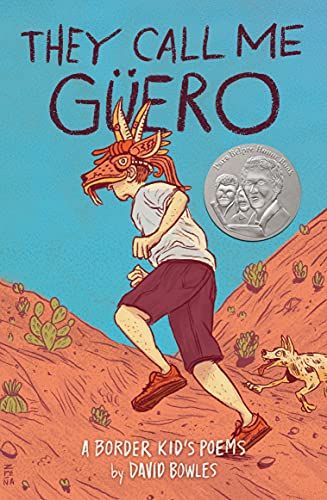The Whippoorwill Award Aims to Elevate Rural Representation in Middle Grade and Young Adult Books
Middle grade and young adult literature has made great strides in recent years to become more inclusive and diverse, but one area that is still lacking is authentic representation of rural places and experiences. The Whippoorwill Award is aiming to change that. Given annually, this award honors 10 middle grade or young adult books published in the previous year that are set in rural places.
This year’s winners include a wide range of genres, including A Little Bit Country by Brian D. Kennedy, Air by Monica Roe, and The Weight of Blood by Tiffany D. Jackson, and previous winners have included This Poison Heart by Kalynn Bayron, Where the Heart is by Jo Knowles, and Hurricane Child by Kacen Callender.
Named for the whippoorwill bird, which can be found in many rural areas, the mission of this award is “to advocate for books that portray the complexity of rural living by dispelling stereotypes and demonstrating diversity among rural people.” Now in its fourth year, the award has lifted up a diverse selection of books, and the focus is on celebrating a range of experiences rather than narrowing selections to single winners or a handful of honors. Recognizing that “rural” can mean a lot of different things, winners have varied from realistic fiction in rural Southern settings to fantastical stories set in small-town upstate New York, with a lot of variation in between. This attitude of celebrating variety, as well as its unique focus on an underrepresented and often mocked or denigrated setting, makes the Whippoorwill Award an intriguing standout in the many awards for literature for young people.
The Whippoorwill Award was founded by Dr. Jenn Sanders of Oklahoma State University, a Dresser Endowed Professor of Rural Teacher Education, and her doctoral student Jill Bindewald. It launched in 2019, and it honors books that portray “the value of rural spaces, knowledge, cultures, and histories” and represent “the reality of rural places without overly romanticizing or denigrating a place.” Among the first books honored were They Call Me Guëro, David Bowles’s novel-in-verse about a light-skinned boy growing up on the U.S.-Mexican border, and Give Me Some Truth by Eric Gansworth, a YA novel about a teen boy who pins his hopes of getting off his reservation on a Battle of the Bands competition. Since its inaugural year, the books have been published by a nice mix of Big Five and independent publishers.
In an interview with 2023-2024 Whippoorwill Committee Co-Chair Dr. Chea Parton on her podcast Reading Rural YAL, Dr. Sanders discussed how the award started. “I saw this disconnect between the way rural people and places were represented in that when I lived and taught in rural places, I felt there was more diversity than what was represented in a lot of the literature I was seeing.” Dr. Sanders then went on to explain how it was her student Bindewald’s idea to form a national award committee, and together, they worked to form the structure of the award. They chose to focus on middle grade and young adult books, with an emphasis on diverse perspectives in rural settings to “counter the stereotype that rural looks one way or is one thing.”
Dr. Chea Parton is now in her second year of serving on the Whippoorwill Award Committee. For her, the Whippoorwill Award is filling a much-needed gap in the landscape of children’s literature by promoting rural settings and showcasing their importance in the education landscape, as well as to readers. “I remember googling ‘rural YA literature’ only to get four hits and two of them were Jeff Zentner’s The Serpent King,” she says. “Then I googled ‘urban YA literature’ and book after book and list after list popped up.” Now, if you Google “rural YA literature,” articles by Dr. Parton show up on the first page of results, alongside links to the Whippoorwill Award and lists of YA books set in rural areas.
Although the award is only in its fourth year, Dr. Parton is very excited about how it has grown. “I’ve read more rural YA and MG in the last few years than I did my entire existence as a young reader…[a]nd for the most part they’re not stereotypical or position rural folks as the butt of a redneck joke. I’ve seen a lot of complex and nuanced representation of rural people.” Previous Whippoorwill Award winners have also collected an impressive number of awards and accolades. The books are also National Book Award finalists, Pura Belpré honors, Stonewall Award Winners, and Walter Dean Myers Award honors and winners. Many of them have been named on regional or state reading lists.
However, Dr. Parton does acknowledge there is still work to be done, saying, “there are rural identities that are conspicuously and frustratingly missing. Rural identities themselves are forced to the margins, but the multiply marginalized even more so. Representations of rural Black folks, rural AAPI, rural Latine, and rural Muslim folks seem to be the hardest to come by. We’ve seen an increase in rural Indigenous representation and rural queer representation, but definitely need more books that tell the stories of all these folks.”
Whippoorwill Award-winning author Monica Roe also hopes that bringing more recognition to rural experiences in fiction will help society be more sensitive to the types of stereotypes rural people face. “In so many areas of media or pop culture it’s considered completely acceptable to actively promote harmful rural stereotypes — think trailer trash, inbred ignorance, or any number of other terrible tropes aimed at historically marginalized regions such as Appalachia — to an almost gleeful level,” she says. Even now, some not-so-flattering images of rural living and rural life still persist and make their way into books being published today. But as Roe pointed out, “the assumption of rural as being monolithically conservative, country music-worshipping, flag-waving, and non-diverse does such a disservice to how complex and nuanced rural American really is.”
Dr. Parton hopes that as time goes on and more people learn about the award, the award will get more recognition from readers, teachers, librarians, and the publishing industry. “We are working on setting up a way that teachers, authors, and librarians can get their hands on seals for the award winning books on their shelves. We love seeing winning authors share on social media and hope that other rural authors and publishers of rural books see and submit their work for consideration.” Currently, authors and publishers can view the criteria and submit their original work to the committee for consideration. Instructions can be found on the award website. Most of the submissions come from publishers, but many come from authors as well. Currently, the committee reviews an average of 50 books per year, and they often reach out to authors who write rural-set literature and encourage them and their publishers to submit books for review.
After being named a Whippoorwill Award winner in 2023, Roe is now pleased to be on the committee for 2024. She sees it as a form of giving back to the writing community and helping other rural writers hopefully find an audience. “Rural people from all demographic backgrounds face barriers to even get published — location, stereotypes within the industry or society at large, and lack of internships or opportunities,” she says.

“I would love to see Whippoorwill Award displays in school and local libraries. Or hear from teachers via social media how they’re using the award winners in their classrooms,” Dr. Parton said, adding that word of mouth is critical to the award’s success. “We love seeing winning authors share on social media and hope that other rural authors and publishers of rural books see and submit their work for consideration.” This word of mouth is helpful not only in elevating the existence of the award to the attention of publishers and to those who put books in the hands of kids and teens but also to those teachers, librarians, and authors who work hard to promote rural literature. Dr. Parton sees teachers and authors as integral to helping the award function. Currently, the Whippoorwill Award is decided by a group of committee members, mostly educators, who are all volunteers. In the future, Dr. Parton would love to see the committee grow and diversity “to be as representative of the plethora of rural identities as possible.”
In Roe’s view, publishing still has some work to do on this front. She cites the need for sensitivity and authenticity readers who can read for rural experiences. “I hope these conversations continue in the future and I hope publishing as a whole is willing to do the work to elevate rural writing and authors and make sure the portrayals they are releasing are authentic — not sanitized and idealized, but complex and not one-sided.” Having an award dedicated to exemplary rural writing might inspire publishers and creators to take extra care in how they craft these stories. Roe sees the creation of the Whippoorwill Award — and Dr. Parton’s work with her blog Literacy in Place — as a step in the right direction. “But there is still work to be done.”
When asked about the importance of the work of the committee and the Whippoorwill Award, Dr. Parton emphasized the importance of sharing diverse stories. “Everybody deserves to see their identity, their experiences, their life chronicled on paper — to know that who they are is valuable and worth writing about — so we definitely need more intersectional rural stories.”
To see a full list of the 2023 Whippoorwill Award winners and past winners, as well as this year’s committee members, check out the Whippoorwill Award website.





